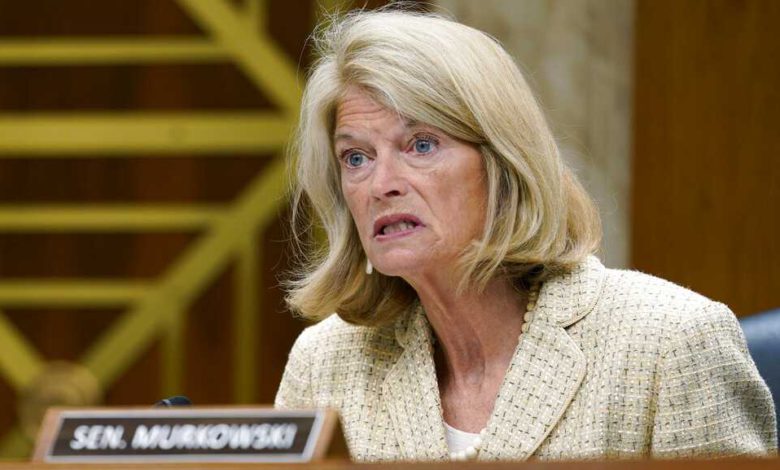

Alaska Republican U.S. Sen. Lisa Murkowski has won reelection, defeating Donald Trump-endorsed GOP rival Kelly Tshibaka.Murkowski beat Tshibaka in the Nov. 8 ranked choice election. The results were announced Wednesday, when elections officials tabulated the ranked choice results after neither candidate won more than 50% of first-choice votes. The race also included Democrat Pat Chesbro and Republican Buzz Kelley, who suspended his campaign after the August primary and endorsed Tshibaka. Murkowski was the only Senate Republican who voted to convict Trump at his impeachment trial last year who was on the ballot this year. Trump was not convicted. But her vote was a sore point for the former president, who vowed to campaign against her. In 2020, before that year's election and far before Tshibaka jumped into the Senate race, Trump announced plans to campaign against Murkowski after she criticized him: "Get any candidate ready, good or bad, I don't care, I'm endorsing. If you have a pulse, I'm with you!" He appeared at a rally in Anchorage in July for Tshibaka and Sarah Palin, whose run for Alaska's lone U.S. House seat he endorsed. He more recently participated in a telerally for Tshibaka in late October. Tshibaka, who worked in federal inspectors general offices before leading the Alaska Department of Administration for two years, credited Trump with helping to raise her name recognition and give her candidacy a boost.Murkowski, who was censured by state Republican party leaders last year for offenses that included her impeachment vote, paid little attention to Trump during a campaign in which she emphasized a willingness to work across party lines and focused on her record and seniority. Murkowski, a moderate who has been in the Senate since 2002, is the most senior member of Alaska's congressional delegation following the death in March of Republican Rep. Don Young, who held Alaska's House seat for 49 years. Murkowski is no stranger to tough reelection fights. She won a general election write-in campaign in 2010 after losing her party primary that year to a tea party Republican. Coming into this race, she had never won a general election with more than 50% of the vote.This year's elections were held under a new system approved by voters in 2020 that replaced party primaries with open primaries and instituted ranked voting in general elections. Under the open primary system, the top four vote-getters, regardless of party affiliation, advance to the general election. Tshibaka criticized a super PAC aligned with Senate Republican Leader Mitch McConnell for running ads against her when she said those resources could have been used to help Republicans in other states.She said she "ranked the red," or the Republican candidates, on her ballot — but not in the Senate race. She said she did not consider Murkowski a "red" candidate."I didn't vote her either," Murkowski said on Election Day.
Alaska Republican U.S. Sen. Lisa Murkowski has won reelection, defeating Donald Trump-endorsed GOP rival Kelly Tshibaka.
Murkowski beat Tshibaka in the Nov. 8 ranked choice election. The results were announced Wednesday, when elections officials tabulated the ranked choice results after neither candidate won more than 50% of first-choice votes.
The race also included Democrat Pat Chesbro and Republican Buzz Kelley, who suspended his campaign after the August primary and endorsed Tshibaka.
Murkowski was the only Senate Republican who voted to convict Trump at his impeachment trial last year who was on the ballot this year. Trump was not convicted. But her vote was a sore point for the former president, who vowed to campaign against her.
In 2020, before that year's election and far before Tshibaka jumped into the Senate race, Trump announced plans to campaign against Murkowski after she criticized him: "Get any candidate ready, good or bad, I don't care, I'm endorsing. If you have a pulse, I'm with you!"
He appeared at a rally in Anchorage in July for Tshibaka and Sarah Palin, whose run for Alaska's lone U.S. House seat he endorsed. He more recently participated in a telerally for Tshibaka in late October. Tshibaka, who worked in federal inspectors general offices before leading the Alaska Department of Administration for two years, credited Trump with helping to raise her name recognition and give her candidacy a boost.
Murkowski, who was censured by state Republican party leaders last year for offenses that included her impeachment vote, paid little attention to Trump during a campaign in which she emphasized a willingness to work across party lines and focused on her record and seniority. Murkowski, a moderate who has been in the Senate since 2002, is the most senior member of Alaska's congressional delegation following the death in March of Republican Rep. Don Young, who held Alaska's House seat for 49 years.
Murkowski is no stranger to tough reelection fights. She won a general election write-in campaign in 2010 after losing her party primary that year to a tea party Republican. Coming into this race, she had never won a general election with more than 50% of the vote.
This year's elections were held under a new system approved by voters in 2020 that replaced party primaries with open primaries and instituted ranked voting in general elections. Under the open primary system, the top four vote-getters, regardless of party affiliation, advance to the general election.
Tshibaka criticized a super PAC aligned with Senate Republican Leader Mitch McConnell for running ads against her when she said those resources could have been used to help Republicans in other states.
She said she "ranked the red," or the Republican candidates, on her ballot — but not in the Senate race. She said she did not consider Murkowski a "red" candidate.
"I didn't vote her either," Murkowski said on Election Day.
Source link





